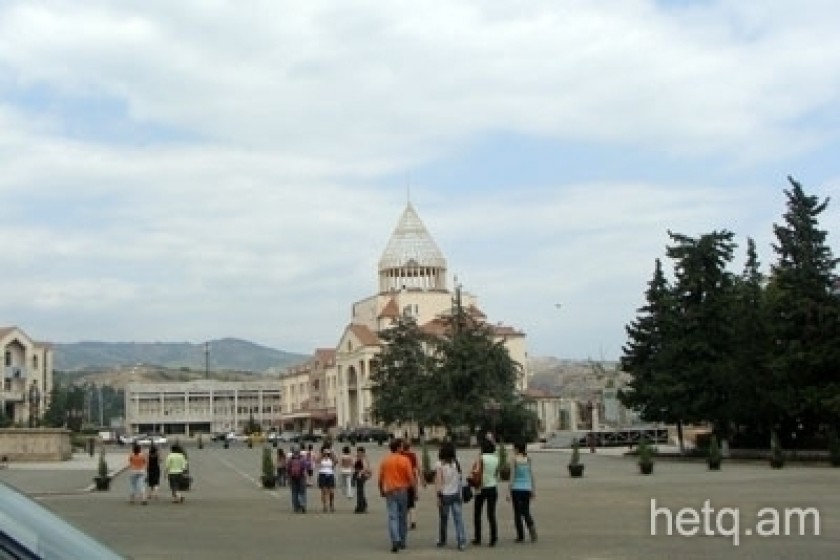
Achieving Peace in Nagorno-Karabakh
By Diogo Pinto
"The Nagorno-Karabakh conflict between Armenia and Azerbaijan is normally referred to as a "frozen" conflict, and that seems to lead to complacency citizens and the European institutions alike. However, as the war in Georgia clearly demonstrated, frozen does not mean safe.
Apart from the violations of the cease-fire that very often end with deaths on both sides of the line of contact, this conflict has a huge impact in the economic, political and social situations in the two countries, and is hampering what could be a harmonious development and a successful regional integration process, as well as a progressive “Europeanisation” of the entire region, which has been defined as vital for the European interests.
I recently chaired a meeting that brought together representatives of the European Movement of the three countries in the Southern Caucasus region – Armenia, Azerbaijan and Georgia - which aimed at starting a direct dialogue between the two sides.
The meeting took place in Tbilisi, as Georgia is seen as neutral ground and the only country with good relations with both neighbours, making it easily accessible to citizens from both sides.
Additionally, Georgia is itself home to more than 280,000 Azerbaijanis and almost 250,000 Armenians, who represent, together, more than 12% of the country’s population. Last but not least, Georgia has its own frozen conflicts and bears witness to the fact that unresolved conflicts carry the danger of escalation and violence.
After the initial tension was overcome, two aspects emerged as the most striking. On one hand, the tremendous impact that the conflict has on both Armenia and Azerbaijan, be it economic (in Armenia more than in Azerbaijan) or social (more in Azerbaijan than in Armenia), as well as on the quality of democracy and the respect for individual and collective freedoms.
On the other hand, it was almost shocking how little one side knows about the other, and how much of it is based on propaganda-induced prejudices.
One of the outcomes of this meeting was that it would not be the last. It was decided to pursue the dialogue, with the next meeting taking place in November, this time in Baku.
Another outcome was that projects will be jointly developed and implemented by the national chapters of the European Movement in the South Caucasus region.
We are well aware of the complexity of the situation and know that good will alone isn’t enough. We also understand our limitations as simple civil society actors, and thus understand that the resolution of the conflict isn’t in our hands only.
But we also realise that, when it comes to building peace and good neighbourly relations, we owe a great deal to the European Movement’s history and the bold ideas put forward by our founders in 1948’s Congress of The Hague.
The organisations of the European Movement in Armenia and Azerbaijan have been working for several years to promote the European integration of their respective countries. In doing so, they interact often with the citizens and the institutions, other civil society actors and even with economic agents.
Standing on this privileged central spot, they are terribly aware of the harm and of the limitations the prevalence of the conflict imposes upon the European aspirations of both populations. They regard it as their responsibility to raise this awareness among their members and partners, and hope to turn it into an energy source capable of fuelling the peaceful resolution of the conflict.
Initiatives such as this one deserve to be supported by the European Union. The EU has a lot to gain from increasing its efforts and commitments towards the peaceful resolution of the conflict, by getting more decisively and more visibly behind the civil society actors from the region who are willing to work for change.
The peaceful resolution of the conflict would not only be positive for the countries involved; peace and stability in the South Caucasus region would have immensely positive repercussions for the Black Sea area in general, with spill-over effects in Moldova, Ukraine and maybe reaching as far as Russia.
It would ease the relations between Armenia and Turkey, and between Azerbaijan and Iran, which could only benefit the European Union and its Foreign Affairs and Security Policy’s interests.
The end of the conflict, with a peaceful, EU-mediated solution, accepted by all interested parties, would not only bring much deserved opportunities of economic and social development for the peoples of the region, but would also assert the EU’s core values of democracy and human rights as their main reference, and the EU itself as its preferential strategic partner."
Diogo Pinto is secretary-general of the European Movement International in Brussels.
 Videos
Videos Photos
Photos
Comments (1)
Write a comment